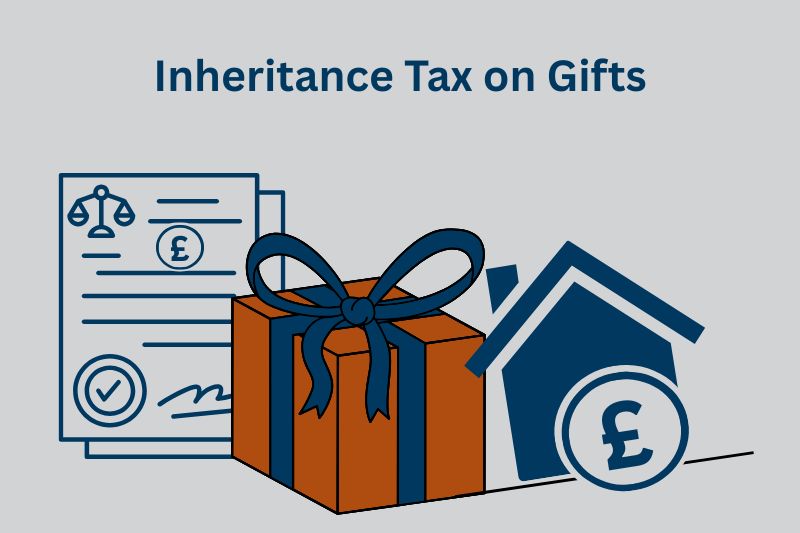Articles >
Understanding Inheritance Tax on Gifts: What You Need to Know

August 26, 2025
Inheritance tax (IHT) can be a complex topic, especially when it comes to gifts given during your lifetime. Here’s a practical guide to understand how inheritance tax works on gifts, what the main rules are, and how you can plan to minimise liability.
On this page:
- What Is Inheritance Tax on Gifts?
- When Does Inheritance Tax Apply to Gifts?
- How Are Gifts Taxed If You Die Within Seven Years?
- What Counts as a Gift?
- Key Allowances and Exemptions
- The Nil-Rate Band and Spouse/Civil Partner Exemptions
- Gifts With Reservation of Benefit
- Planning Tips
What Is Inheritance Tax on Gifts?
Inheritance tax in the UK is typically charged on the value of your estate when you pass away. However, some gifts you make while alive could also be subject to IHT if you die within a certain time frame after giving them. These gifts are examined during the administration of your estate to determine if tax should be paid.
When Does Inheritance Tax Apply to Gifts?
The key rule is the seven-year rule. If you give away assets and survive for seven years after making the gift, those gifts are usually completely exempt from inheritance tax, but if you die within seven years, the gifts may be added back to your estate for tax purposes.
How Are Gifts Taxed If You Die Within Seven Years?
Gifts in the last 3 years of your life: taxed at the full inheritance tax rate of 40% (on values above the IHT thresholds).
Gifts made between 3 and 7 years before your death: taxed at a reduced rate (‘taper relief’), which gradually lowers the tax owed as the seven years pass:
| Years Between Gift and Death | Tax Rate on Gift |
|---|---|
| 0-3 years | 40% |
| 3-4 years | 32% |
| 4-5 years | 24% |
| 5-6 years | 16% |
| 6-7 years | 8% |
| Over 7 years | 0% |
Taper relief only applies if the total taxable gifts made in the seven years before you die exceed the IHT threshold of £325,000.
This article may also help you: How the 7-Year Rule in Inheritance Tax Works and Ways to Reduce Liability
What Counts as a Gift?
Nearly anything can count as a gift for IHT purposes, including:
- Money
- Personal goods (like jewellery or antiques)
- Property or land
- Stocks and shares
- The difference in value if you sell something (like a house) below market value to a relative
Key Allowances and Exemptions
UK offers several exemptions that allow you to give away money and assets each year with minimal IHT worries:
Annual exemption: You can give away up to £3,000 each tax year free from IHT. If unused, you can carry the exemption forward one year (up to £6,000).
Small gifts exemption: Any number of gifts up to £250 per recipient per tax year are immediately exempt, as long as you haven’t used another exemption on the same individual.
Wedding/civil partnership gifts: Exempt up to £5,000 for a child, £2,500 for a grandchild, or £1,000 for others.
Regular gifts out of income: If you make a series of gifts from your surplus income (not from your capital or savings), and it doesn’t affect your standard of living, these are fully exempt, but you must keep clear records.
The Nil-Rate Band and Spouse/Civil Partner Exemptions
Nil-rate band (NRB): The first £325,000 of your estate (including taxable gifts) is exempt from IHT.
Residence nil-rate band: If you leave your home to direct descendants, you may get a further £175,000 exemption, raising your total threshold to £500,000.
Gifts to spouses/civil partners: Completely exempt, no matter the value. Unused thresholds can be transferred to the surviving spouse.
Gifts With Reservation of Benefit
If you give an asset (such as your home) but continue to benefit from it, perhaps by living there rent-free, it is still considered part of your estate for IHT. Only gifts made with no strings attached are truly removed from your estate for tax purposes.
Planning Tips
- Plan gifts strategically: Begin gifting early if you wish to move assets out of your estate.
- Document everything: Keep clear records of what you gave, to whom, when, and whether exemptions were used.
- Professional advice: Consider consulting an inheritance tax advisor, especially for larger estates or complex situations.
Understanding inheritance tax on gifts is crucial for maximising your wealth and providing for your loved ones. Take advantage of exemptions, follow the seven-year rule, and keep everything well documented for peace of mind.
Want to explore more strategies on inheritance tax planning? Browse our latest guides or contact us today to start planning with confidence.
Please note: The content of this article is for informational purposes only. It should not be relied upon as legal, financial, or tax advice. For advice specific to your situation, please speak with a qualified professional, as regulations may have changed since publication.

